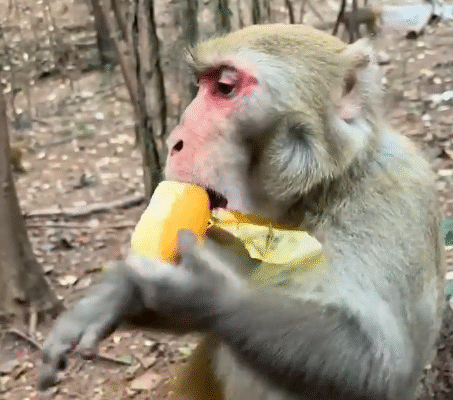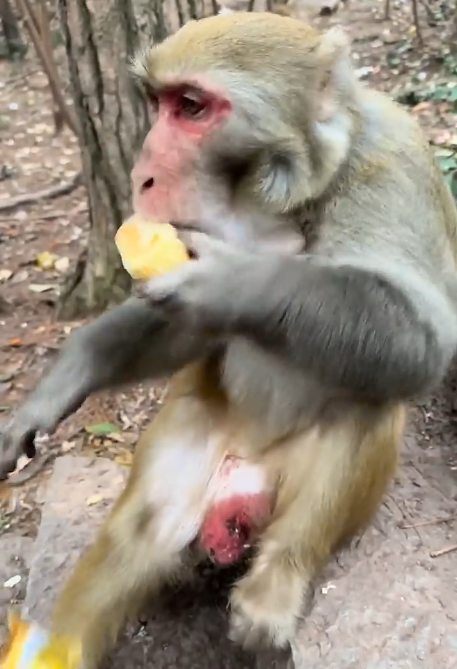
Deep in the quiet edge of a tropical village, where the forest meets the dirt road, there lived a small monkey named Milo. Once cheerful, playful, and full of life, Milo had not been himself for days. His eyes, once bright and mischievous, now looked dull and tired. His ribs showed faintly through his thin fur, and his tiny hands trembled as he searched the dry ground for scraps.
Milo had been hungry for several days — and no one seemed to notice.
A Lonely Search for Food
The forest that used to be full of fruit had changed. The trees no longer bore the juicy mangoes and bananas he loved. The rains had not come for weeks, and the streams were shallow and muddy. Even the insects seemed to have vanished.
Every morning, Milo would climb from his small shelter — an old hollow log near the road — and start his search. He’d look under leaves, climb bushes, and sniff around for any sign of food. Sometimes he found a piece of rotten fruit, but most days, nothing.
His stomach growled loudly. He clutched it with both hands and looked around helplessly. A breeze rustled the dry leaves, but there was no sign of other monkeys. His family troop had moved deeper into the forest weeks ago in search of food, but Milo, too weak to keep up, had been left behind.
Now, he was completely alone.
The Encounter with the Humans
One afternoon, Milo heard laughter and voices echoing through the trees. Curious, he climbed up to a branch to see what was happening. Down below, near the village road, a group of humans were selling fruits and vegetables at a small roadside market. He could see bananas — big, ripe, golden bananas — piled high in a basket.
His heart raced. He hadn’t eaten properly in days. He licked his dry lips, his mind filled with a single thought: Food.
But he was scared. The last time he approached humans, they had chased him away with sticks. Still, hunger was stronger than fear. He crept closer, hiding behind a bush. He waited, watching carefully.
When one of the women turned away to talk to another vendor, Milo made his move. He leaped forward, grabbed a banana, and ran!
But before he could escape, a man shouted, “Hey! Monkey thief!” The crowd turned. Someone threw a small stick, hitting the ground near his feet. Milo squealed and bolted toward the trees, the banana clutched tightly in his hands.
He ran until his heart pounded and his lungs burned. Finally, he stopped under a large fig tree, panting. The banana was bruised, but still good. Trembling, he peeled it slowly and took a bite. The sweet taste filled his mouth, and tears welled in his eyes.
For a moment, the world felt peaceful again.
The Return of the Empty Stomach
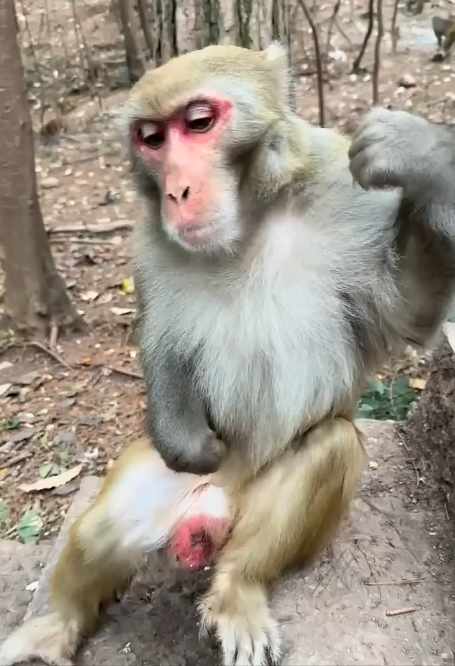
The next day, Milo returned to the same spot, hoping to find more. But this time, the humans had moved their fruit baskets farther from the edge. They’d learned from yesterday’s “monkey theft.” Milo sat on the tree branch above, watching longingly. He didn’t dare go down.
By sunset, he still hadn’t eaten. His stomach twisted in pain. He lay down on the branch, eyes half-closed, too weak to move. Night fell, and the forest came alive with the sounds of crickets and owls. But for Milo, there was only silence and hunger.
His dreams that night were strange and vivid — full of bananas, coconuts, and mangoes. He saw his mother grooming his fur, his siblings playing, and his father leading the troop to a secret fruit grove. When he woke up, the sun was already high, and his belly was empty again.
He tried to climb down, but his arms trembled. “I need food,” he thought, eyes scanning the horizon. “Just a little. Please…”
A Kind Stranger
Fate, however, had something different planned.
That morning, a young boy named Ravi was walking to the market with a basket of leftover fruit from his family’s stall. His mother had told him to throw away the ones that had gone too soft to sell. As he walked, he noticed movement in the trees above — a small, frail monkey watching him.
Ravi stopped. The monkey’s eyes were sad, pleading.
“You look hungry, little guy,” Ravi whispered softly. He pulled a banana from the basket and gently placed it on the ground. Then he stepped back.
Milo stared at the banana, suspicious at first. He looked at the boy, then at the fruit. Slowly, he climbed down, inch by inch, ready to run at any moment. When he reached the ground, he snatched the banana and darted behind a tree.
Ravi laughed quietly. “It’s okay, eat. I won’t hurt you.”
Milo hesitated, then peeled the banana. He ate it in seconds, then licked the peel. Ravi smiled warmly and left another fruit — this time, a soft mango.
Every morning after that, Ravi returned. Each day, he brought a few bananas, mangoes, or peanuts for his new friend. At first, Milo stayed distant, hiding behind trees. But as days passed, he began to trust the boy. He would wait for Ravi, sitting on a low branch, and when the boy arrived, he’d make happy little chirps.
For the first time in weeks, Milo wasn’t hungry.
Friendship Through Food
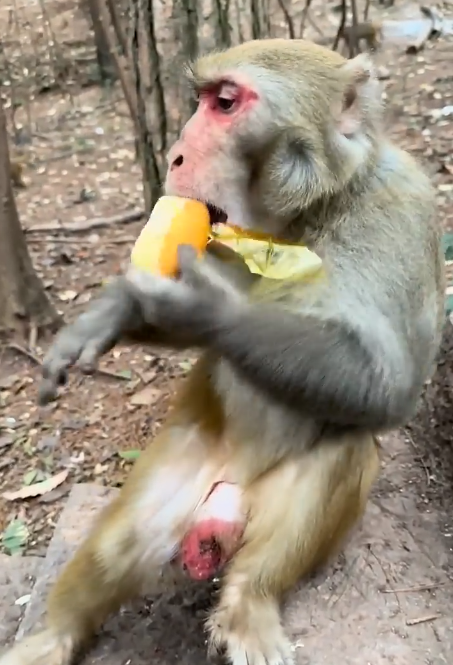
As Milo regained his strength, his playful nature returned. He started showing off for Ravi — swinging from branches, flipping upside down, and making funny faces. Ravi would laugh so hard that even the nearby vendors started noticing the bond between the two.
Some people still didn’t like having monkeys near the market, but Ravi’s kindness changed a few minds. Soon, others began leaving scraps of fruit out for Milo too.
Milo became something like a mascot for the little market. He’d greet people with curious eyes and occasionally pat children’s hands gently when they offered him food.
But no matter how many new faces he saw, he always looked for Ravi first. Their bond was special — one built from compassion and trust, born out of hunger and kindness.
The Day of the Storm
One afternoon, dark clouds rolled over the sky. Wind howled, trees swayed, and thunder echoed through the hills. Ravi didn’t come that day, and Milo huddled inside his hollow log as rain poured down.
For two days, the storm raged on. When it finally stopped, the forest looked different. The old fig tree had fallen, and the stream was muddy again.
Milo, hungry once more, made his way toward the market. He found it partially flooded, fruit stalls scattered and broken. He looked around for Ravi but saw no one.
Then, from behind a pile of crates, he heard a familiar voice. “Milo!”
It was Ravi, soaked but smiling, holding a small basket of bananas. He placed them down gently and said, “I didn’t forget you, little buddy.”
Milo squeaked happily and jumped onto Ravi’s shoulder, hugging him tightly.
A Lesson of Love
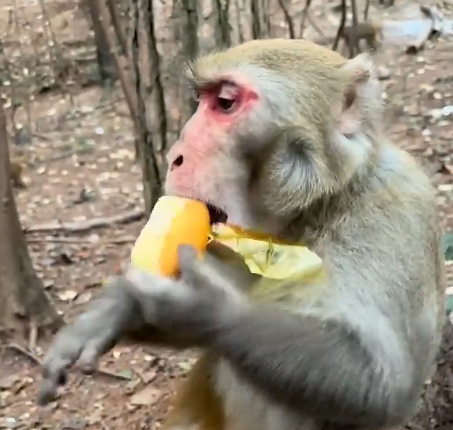
As time went on, Milo became stronger, healthier, and more confident. Though he sometimes wandered back into the forest, he always returned to the market — to his friend.
People often asked Ravi, “Why do you feed that monkey every day?”
He would smile and answer, “Because when he was hungry, he didn’t need scolding — he needed help. And maybe that’s true for all of us.”
Milo didn’t understand human words, but he understood kindness. Every time he looked at Ravi, he saw not just a boy — but the reason he was alive.
Epilogue: The Monkey Who Taught a Village Compassion
Months later, a sign appeared near the market entrance. It read:
“Please don’t chase the monkeys. Feed them if you can. Hunger hurts all hearts.”
Milo sat nearby, nibbling on a banana that Ravi had given him, watching the sunset. His eyes sparkled once more, full of joy and peace.
He had been hungry for several days once — but that hunger had led him to something greater than food.
It led him to friendship. 💛🐒
